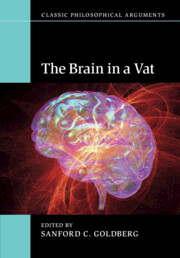Book contents
- Frontmatter
- Contents
- List of contributors
- Acknowledgments
- 1 Introduction: Putnam's reflections on the brain in a vat
- Part I Intentionality and the philosophy of mind and language
- 2 Putnam on brains in a vat
- 3 How to think about whether we are brains in vats
- 4 Brains in vats, causal constraints on reference and semantic externalism
- 5 Extended minds in vats
- Part II Epistemology
- Part III Metaphysics
- Bibliography
- Index
5 - Extended minds in vats
from Part I - Intentionality and the philosophy of mind and language
Published online by Cambridge University Press: 05 June 2016
- Frontmatter
- Contents
- List of contributors
- Acknowledgments
- 1 Introduction: Putnam's reflections on the brain in a vat
- Part I Intentionality and the philosophy of mind and language
- 2 Putnam on brains in a vat
- 3 How to think about whether we are brains in vats
- 4 Brains in vats, causal constraints on reference and semantic externalism
- 5 Extended minds in vats
- Part II Epistemology
- Part III Metaphysics
- Bibliography
- Index
Summary
Hilary Putnam has famously argued that “we are brains in a vat” is necessarily false. The argument assumes content externalism (also known as semantic externalism and anti-individualism), that is, the view that the individuation conditions of mental content depend, in part, on external or relational properties of the subject's environment. Recently content externalism has given rise to the hypothesis of the extended mind, whereby mental states are not only externally individuated but also externally located states. This chapter argues that when content externalism is combined with the extended mind hypothesis it is robbed of its anti-skeptical power. Given the extended mind hypothesis, the supercomputer and the envatted brain can be regarded as aspects of the extended mind of the evil scientist. On this view, the thought contents of the coupled brain–computer–scientist system do not differ from those of a normal human. But without a difference in thought contents Putnam's anti-skeptical argument crumbles.
Apart from giving rise to the extended mind hypothesis, content externalism has given rise to the thesis of embedded cognition, that is, the view that cognition depends not just on the brain but also on the body and its interaction with the environment. This chapter argues that when content externalism is combined with the thesis of embedded cognition, the vat has to fill in everything the world provides for the brain to realize the kind of mind we have. But if the vat fills in everything the world provides, then the skeptical problem evaporates.
Section 5.1 explains content externalism and gives a brief account of Putnam's refutation of the brain-in-a-vat scenario. Section 5.2 discusses the hypothesis of the extended mind. Section 5.3 argues that adding the extended mind hypothesis to content externalism undermines Putnam's refutation of the brain-in-a-vat scenario. In Section 5.5 it is shown that the thesis of embedded cognition takes away the skeptical sting the brain-in-a-vat scenario is said to have. Section 5.5 offers some concluding remarks.
Putnam on brains in vats
External world skepticism states that we don't know many of the worldly propositions that we take ourselves to know. Skeptical arguments typically take as their starting point skeptical scenarios.
- Type
- Chapter
- Information
- The Brain in a Vat , pp. 54 - 72Publisher: Cambridge University PressPrint publication year: 2016

